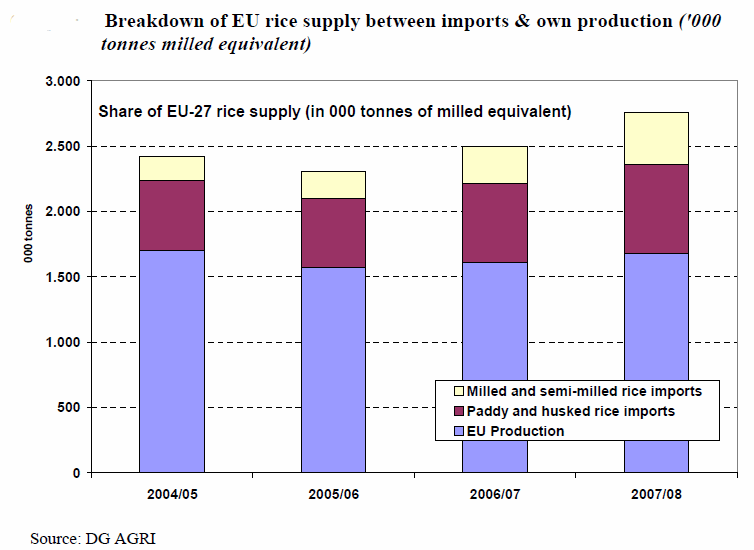There was a fundamental reform of the EU rice market in 2003. The intervention price was cut in half to bring it down to the (then) level of the world prices, and producers were compensated by an increase in direct payments. An important impetus for this reform lay in the market opening offer by the EU to least developed countries (LDCs) under the Everything But Arms agreement which promised duty-free and quota-free access for rice imports from LDCs from September 2009.
Few LDCs are net exporters of rice. However, it was feared that LDCs might export, in line with the rules of origin, the totality of their domestic rice production to the EU, while importing their domestic consumption requirements from the world market. Another fear was that the LDCs might import raw rice, process it and then export it back to the EU, adding sufficient value so as to meet the rules of origin requirements. Reducing the support price for rice by around 50% was projected to translate into a very sharp fall in EU domestic prices towards world market levels, which would boost EU rice competitiveness while reducing the attractiveness of the EU market as an export market.
Changes in the EU rice import regime
This reform had a knock-on consequence forthe general import regime for rice. Although the EU had negotiated high bound tariffs in the Uruguay Round, applied tariffs were limited under a special regime negotiated with principal suppliers to a fixed margin of preference over the EU intervention price. With the reduction in the EU intervention price the continuation of this import regime could have led to widely varying border protection which could even fall to zero duty. Thus the EU decided to make use of the WTO provision to withdraw its Uruguay Round offer and introduced a new tariff regime while offering to negotiate appropriate compensation with its principal suppliers.
Although agreement with India and Pakistan (which mainly supply high-quality basmati rice for which a zero-duty regime was agreed) was quickly reached, the US objected to the unilateral change in the import regime and threatened to withdraw an equivalent value of trade concessions from the EU. This dispute was resolved in early 2005 whereby the EU agreed to lower tariffs on husked rice imports from the US provided imports did not grow more rapidly than agreed levels. A final agreement with Thailand was reached soon after.
The European Commission has just released a report reviewing the operation of these trade agreements in the rice sector which concludes that they have worked satisfactorily. Overall, there has been significant growth in EU rice consumption (partly stimulated by the access of Bulgaria and Romania) while EU production has remained stable, with the growing being met by imports. As a result, rice self-sufficiency has fallen from over 90 per cent in the late 1990s to around two-thirds today.

EU rice self-sufficiency to fall further in future
In the future, there is a likely to be a continued trend towards lower self-sufficiency. In recent years, there was a dramatic increase in world rice prices as a result of trade policy interventions by some of the major exporters and panic reactions by some importers, which has also benefited EU rice producers. Rice prices have been more than double intervention levels. With better global rice harvests, rice prices are likely to fall back from recent levels. In the CAP Health Check, the remaining coupled payments to rice producers will be decoupled, although Member States retain the possibility of some coupled payments under the Article 68 national envelope payments.
Further changes in the EU rice import regime will take place this September (when the remaining quotas are removed on imports from LDCs under the Everything But Arms agreement) and on 1 January 2010 when imports will be freed from all African, Carribean and Pacific countries that have signed Economic Partnership Agreements with the EU. However, the latter is not expected to have any major impact as only two ACP countries (Guyana and Surinam) are currently exporters of rice to the EU.

